
Top 10 Films of 2013
This is Deep Focus Review’s Top 10 Films of 2013 and year-end review. 2013 started off slow. Just a few titles stuck with me from early in the year (Side Effects, Disconnect, Stoker, and The Place Beyond the Pines), and the summer brought more disappointments than I would like to remember. But then, the entire year housed major letdowns—most of them large-scale blockbusters like Oblivion, Pacific Rim, Elysium, Ender’s Game, World War Z, Thor: The Dark World, and especially Man of Steel. Some looked amazing but their stories felt underdeveloped; others, such as Star Trek Into Darkness, were hugely entertaining but far too derivative. Overall, as usual, the year’s best films were independents and those which didn’t open until the Fall-Winter season, when theaters were overloaded with Oscar contenders.
The year also boasted a few majorly underrated titles which deserve recognition. Namely, The Counselor and The Lone Ranger. Though critically panned upon their release, these two idiosyncratic, almost impenetrable films demand reconsideration for their devotion to a strange logic. The Counselor was a spare crime drama in which the literary density of Cormac McCarthy is brought to film through a series of enigmatic but unforgettable conversations, performed by an all-star cast and, just like McCarthy’s writings, the film requires that the viewer consider less the events of the story but the symbolism of the dialogue. The Lone Ranger, on the other hand, was a rousing entertainment told to a young child, a Lone Ranger fan, from Tonto’s octogenarian perspective. Tonto’s story is filled with misremembered details, elaborations, and harsh memories of his peoples’ annihilation, and the resulting film’s tone was a rollercoaster, albeit intentionally so. Rewatch or catch these films for the first time with a new consideration of their off-kilter approaches and you may appreciate how much thought was put into their construction.
Runners Up: About Time, All Is Lost, August: Osage County, The Counselor, Disconnect, Enough Said, Gravity, The Hobbit: The Desolation of Smaug, Iron Man 3, The Lone Ranger, Monsters University, Mud, Philomena, The Place Beyond the Pines, Stoker, To the Wonder, Trance, The Wolverine, The World’s End, and You’re Next
Honorable Mention:
 Catching Fire
Catching Fire
Catching Fire proved exceptional not only by living up to its cultural phenomenon and earning a bazillion box-office dollars worldwide, but because director Francis Lawrence happened to deliver a blockbuster loaded with heavy themes from the book—a sociopolitical commentary far removed from your typical young adult novel. Suzanne Collins’ trilogy of source novels begins as a rousing entertainment, moves into a stark commentary on the state of entertainment, and ends with a devastating portrait of traumatized humanity. Lawrence, his rich visual treatment refreshingly crisp and lush, perfectly captures the mood of Collins’ second Hunger Games book, the sense of impending revolution and growing unrest under every piece of cleverly layered dialogue. And yet, Jennifer Lawrence’s intense performance somehow remains primal, her Katniss Everdeen unaware that she’s a symbol of a revolt in which she’s not yet playing a part. Casual and devoted fans alike should be overjoyed with this Empire Strikes Back-esque entry in Collins’ exciting trilogy, and be enthused about the two films on the horizon.
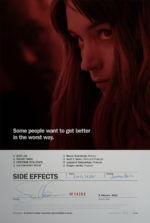 10. Side Effects
10. Side Effects
Supposedly Steven Soderbergh’s last theatrical release (he debuted Behind the Candelabra on HBO mid-year), Side Effects marks his third (and, I suppose, final) collaboration with screenwriter Scott Z. Burns of The Informant! and Contagion. Together they concoct what begins as a commentary on the potentially irresponsible and erratic state of psychopharmachology, drug company advertising, and doctors prescribing mind-altering drugs. But then the story shifts into a twisted tale of murder and blackmail, the first of its kind in a long while to offer genuine surprises and tricky, unpredictable twists. But even that description is saying too much. Rooney Mara stars as a depressed patient of Jude Law’s psychiatrist. When one of his prescribed drugs causes her to commit a murder during a sleepwalking fit, the question becomes one of responsibility, the patient or the prescribing doctor. Channing Tatum and Catherine Zeta-Jones also star. It’s a fascinating picture of Hitchcockian proportions, and a worthy sendoff for the director of Traffic, the Ocean’s trilogy, and sex, lies, and videotape.
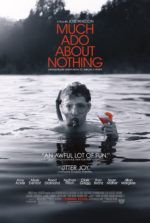 9. Much Ado About Nothing
9. Much Ado About Nothing
Joss Whedon made this black-and-white adaptation of Shakespeare’s Much Ado About Nothing while on vacation between principal photography and post-production on his mega-sized blockbuster The Avengers. He cast lesser-known actors who’ve made appearances in his other film and television work. He shot the picture at his San Diego home, which was designed by his wife. And yet, this uncharacteristic independent release, on the festival circuit since 2012 but distributed theatrically in 2013, contains all the themes and hilarious banter we’ve come to expect from Whedon’s output. From Whedon’s Buffy the Vampire Slayer to his voice in the Marvel Universe, he’s drawn from Shakespearian themes and methods to instill a touch of the Bard into pop-culture. A film like this makes one further appreciate Whedon’s talent as more than just a clever wordsmith rooted in fanboy genres, and leaves us to wonder what he’ll produce during his vacation from The Avengers: The Age of Ultron.
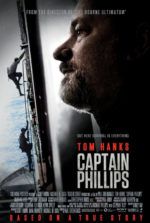 8. Captain Phillips
8. Captain Phillips
Paul Greengrass’ amazingly directed Captain Phillips plunges the viewer into the true story about Somali pirates who take a cargo boat captain hostage for ransom after a failed raid on his ship. Greengrass’ cinema verité style makes this a thrilling experience, a breakneck-paced hostage story that packs an emotional wallop. Suspense is built up to such grueling, stomach churning, sweaty-palmed extremes that some viewers may reel away from the viewing. But at the center is Tom Hanks’ deeply human performance, his best performance in years and easily among the best in his career. He plays a man in control of his emotions throughout the film, managing his crew and fearfully appeasing his captors, until the devastating last scene where, finally released, he, and thus the audience, loses it. Greengrass’ penchant for real-world scenarios has never been matched by such a powerful dramatic thrust.
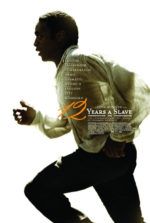 7. 12 Years a Slave
7. 12 Years a Slave
There’s never been a film about American slavery so unflinching, painstakingly researched, and carefully composed as 12 Years a Slave. Based on Solomon Northrup’s 1853 kidnapping and enslavement, the adaptation by British director Steve McQueen (Hunger, Shame) avoids sentimentalizing the story into an audience-pandering prestige picture. This is an art film through and through, complete with glorious photography and the kind of persistent, confrontational performances which set it apart from other films about slavery. Played with soulful humanity by Chiwetel Ejiofor, Northrop goes from Benedict Cumberbatch’s rather kind slave owner (an oxymoron, I know) to the nightmare plantation owned by Michael Fassbender’s master. Both performances, and indeed McQueen’s entire ensemble, are staggeringly good, rounding out this profound experience that few moviegoers will walk away from feeling anything less than completely shaken. As an art film, work of drama, and historical representation, 12 Years a Slave is one of the most important films of 2013.
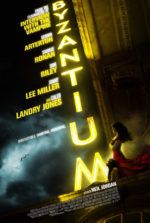 6. Byzantium
6. Byzantium
Neil Jordan’s underseen Byzantium uses thematic elements compared to Twilight and his own Interview with a Vampire and delivers a poetic, visceral gothic horror story and deeply affecting melodrama. But don’t hold its strains of inspiration against it; this indie release is worlds ahead of Stephanie Meyer’s teen series. Rather, Byzantium is a vivid, frightening, and gorgeous tale all its own. Gemma Arterton, feral and beautiful, stars as Clara, the jealous vampire mother of her likewise immortal daughter Elenor (Saoirse Ronan), both of them rendered ageless some two hundred years ago. Jordan leaps back and forth through time throughout the film, constructing an intricate, complicated mother-daughter relationship at the film’s center as, desperate for survival, they’re hunted by a male-elitist league of vamps. Jordan, best known for The Crying Game, combines his signature insight with stunning visuals—powerful and strangely erotic images of blood running down a mountain in a vampire cleansing ritual. In an age where every vampire movie feels the same, this one is truly something to behold.
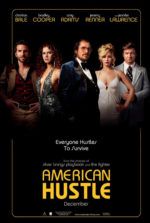 5. American Hustle
5. American Hustle
The film’s of David O. Russell have an infectious energy, their momentum pulling with a freight train impetus that doesn’t slow until days after you’ve seen the film. This is true even of his earlier work on Flirting with Disaster and Three Kings, but expressly so on his more recent audience-favorites: The Fighter, Silver Linings Playbook, and this year’s wonderful American Hustle. Adopting a formal style reminiscent of Martin Scorsese and a wry look at the 1970s akin to P.T. Anderson’s Boogie Nights, Russell’s fast-paced take on the Abscam scandal involves con artists, crooks, and characters who are just plain bonkers. All of them are brought to life by the year’s most impressive and talented ensemble: Christian Bale transforms himself in an overweight, balding schemer; Amy Adams becomes a duplicitous sexpot; Bradley Cooper is a neurotic and unbalanced FBI agent; and Jennifer Lawrence steals the show as an unpredictable housewife. Each element from the stylistic touches to the roster of Oscar-worthy performances contains Russell’s wild dynamism, making it one of the most entertaining films of 2013.
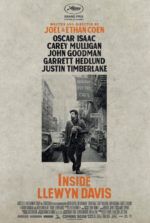 4. Inside Llewyn Davis
4. Inside Llewyn Davis
My favorite kind of Joel and Ethan Coen films are those about a man who, in one way or another, authors his own fate—whether it’s the futile search for meaning in A Serious Man, the meaninglessness of presence in The Man Who Wasn’t There, or the creative pressures in Barton Fink. Each of these films occupies a unique era and character type, yet each embraces a fatalistic outlook toward existence. Their latest like this is Inside Llewyn Davis, in which the Coens explore the folk music scene in Greenwich Village in the 1960s. Oscar Isaac’s performance is of a despicable and soulful man, a struggling musician whose pride refuses to permit him to have success. He meanders around New York City and down to the underworld of Chicago, propelled by his harsh outlook, and unbelievable narcissism, on a quietly surreal and circular journey that only the Coens could conceive. Steeped in period detail, an excellent soundtrack produced by T Bone Burnett, and an elusive narrative construction, Inside Llewyn Davis is an enigma that’s haunting and funny and unforgettable.
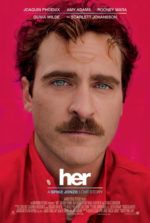 3. Her
3. Her
Visionary and thoughtful, Spike Jonze’s Her is challenging and resonates with surprising emotional consequence, leaving the viewer with much to consider in terms of how they feel about technology, life, and love—though not necessarily in that order. In the same manner of Sandra Bullock’s one-woman show in Gravity or Robert Redford’s solo performance in All Is Lost, Joaquin Phoenix owns the screen, communicating a tenderness and vulnerability that those of us who’ve ever felt lonely or unable to make a connection will cling to. He’s communicating to Samantha, his A.I. operating system voiced by Scarlett Johansson (in a great vocal performance), with whom he falls in love. Perfectly balancing the broader implications and those more intimate, the film orbits around a commentary on the state of relationships today and the detachment that results from advancements designed to bring us closer together. But more significant is the lovely tale of Phoenix’s melancholy Theodor Twombly. With a gorgeous visual approach, fully realized future setting, and a heartening sympathy for the characters onscreen, Jonze’s film uses engaging science-fiction concepts to inform a funny, sad, romantic, and daring motion picture.
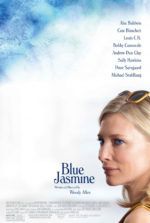 2. Blue Jasmine
2. Blue Jasmine
If American Hustle features the best ensemble of 2013, then Woody Allen’s Blue Jasmine offers the single best performance of the year. Deserving an Oscar and a shower of awards, Cate Blanchett is astounding as the former wife of an upper crust New York businessman (Alec Baldwin) whose shady dealings have left her penniless and forced her to move in with her bohemian San Franscisco-based sister (Sally Hawkins, also excellent). Blanchett’s natural elegance lends to the character’s lingering airs of superiority, but the actress’ portrayal becomes incredibly complex when her character shows signs of a nervous breakdown in the recent past, and another one in the impending future. She’s curiously sympathetic for her troubles, but also damaged and awful—and easily one of Allen’s most fascinating, complex, and absorbing characters. Although there are comic elements throughout, Allen’s film is a devastating character study that won’t connect with as many viewers as his recent travelogue-type pictures (Midnight in Paris, Vicky Cristina Barcelona). Nevertheless, Blue Jasmine is his most deeply felt filmmaking in years, and a definite reminder of why Blanchett remains as highly regarded as she is.
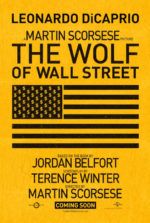 1. The Wolf of Wall Street
1. The Wolf of Wall Street
Martin Scorsese’s divisive indictment of greed in America has left a percentage of the film’s audience questioning its intentions. Some have missed the point completely and suggested the film praises the excesses shown therein, requiring Scorsese and star Leonardo DiCaprio to make official statements that neither The Wolf of Wall Street nor its filmmakers condone the behavior depicted in the film. Largely a comical morality play based on the memoir by Jordan Belfort (played by DiCaprio), the film serves as an intoxicating view of unhindered capitalism, driven by a ravenous hunger for outrageous levels of drugs, sex, and debauchery. The three-hour film plays like an orgiastic, celebratory account of where irresponsible success delivers the reckless. In its representation of excess, Scorsese makes the viewer a participant, riding the wave of Belfort’s life and DiCaprio’s incredible performance (bettered only by his turn in The Aviator) through the overstimulated highs and sobering lows. The director’s filmic mechanics work on overdrive, using impressive tracking shots, fourth-wall-breaking narration (brilliantly scripted by Terence Winter), and a bag of magical formal tricks, all in service of arguably the funniest and most controversial film of the year. That Scorsese, at 71, still has the capacity to challenge his audience is a testament to his skill and vitality as a filmmaker.
Choosing The Wolf of Wall Street as the Best Film of 2013 was, in a way, about picking the most resonant and challenging dark comedy of the year—a year in which my top five films are all dark comedies in one way or another. In fact, for a while there I couldn’t decide and debated on announcing a five-way tie. These films are all that important. But such a decision defeats the entire purpose of a Top 10 list, doesn’t it? Three of my Top 5 contain elements of a financial scandal; three have a downer ending; four are period pieces (one of them in the future); each was made by one of today’s major auteurs (Martin Scorsese, Woody Allen, Spike Jonze, David O. Russell, and the Coen Brothers); and each has a distinctive voice. 2013 was a year in which comedies, dark or touched with dramatic strains, were transformed into some of the most equally entertaining and artful motion pictures in recent memory. And, of course, each was much more than just a comedy. When I think about all of them, I had more fun during and was more challenged by Scorsese’s film than the others, but that should not diminish the significance of the others on this list.





